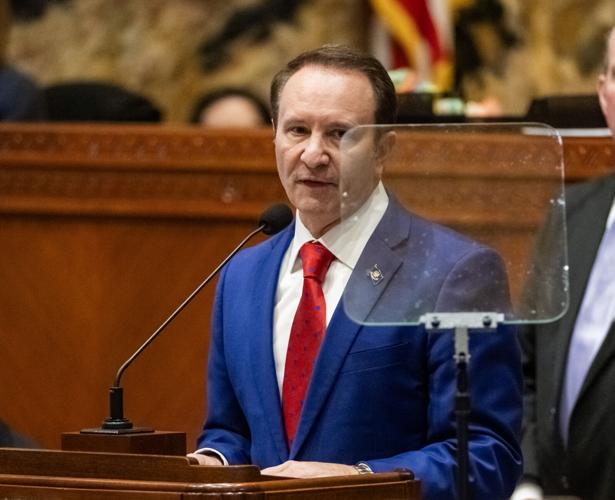Gov. Jeff Landry’s first special session was anything but the victory he claimed in its aftermath. Lawmakers passed only one of his top priorities intact, and that one — a new congressional map that includes a second majority-Black district — was ordered by a federal judge.
In fairness, Landry did notch a political victory with the redistricting plan: He put Republican U.S. Rep. Garret Graves, who endorsed one of Landry’s opponents in the governor’s race, into the new majority-Black 6th District, which many believe is tailor-made for state Sen. Cleo Fields, D-Baton Rouge.
Fields, who is Black, is an unlikely Landry ally, but politics has always made for strange bedfellows. Fields served in Congress from 1993-97 — until his district was struck down by the courts for racial gerrymandering.
The new 6th District has a 54% Black voting age majority, but to get to that number it stretches from Shreveport to Baton Rouge.
While the math appears to favor Fields or another Black Democrat, historic turnout patterns suggest Graves could have a fighting chance. Graves also could run in another district. A congressional candidate need only live in Louisiana to run in any of its six House districts.
Meanwhile, Landry got punked on his biggest session priority — ditching Louisiana’s popular “jungle” primary system for the extremely unpopular “closed” primary system.
Landry caught lawmakers (and most everyone else) unaware by including that and other items in his official call for the special session.
Moreover, Landry’s closed-primary proposal did not allow for runoffs, which means candidates could have won party nominations with only a plurality of the vote. It also would have allowed party bosses to lock more than 800,000 unaffiliated and “other party” voters out of closed primaries.
Worst of all for lawmakers, it would have forced them to run in their party primaries while in session — making them pawns of the governor and party oligarchs.
The governor almost pulled off his Huey “Kingfish” Long-style power grab. The House, which includes many rookies, caved to pressure from Team Landry and passed the restrictive closed-primary bill.
But senators wanted nothing of it.
Led by Senate President Cameron Henry, R-Jefferson, the upper chamber weakened Landry’s closed-primary bill significantly. Senators stripped legislative and statewide elections from the measure, required candidates to get a majority of the vote to secure party nominations (i.e., runoffs will remain, if needed), made the measure effective in 2026 rather than this year and — most damaging of all to Landry's power grab — allowed more than 600,000 unaffiliated or "no party" voters to cast ballots in party primaries. That’s a far cry from what the new governor wanted.
Senators let Landry save face by passing a limited closed-primary bill that applies to federal elections, the state Supreme Court, the state Board of Elementary and Secondary Education and the state Public Service Commission. The House concurred — and then both chambers adjourned.
Landry no doubt will try to build on that narrow “win,” but he’ll likely face even more opposition going forward. The changes to Louisiana's "jungle primary" system are likely to confuse and anger voters, who prefer the current system overwhelmingly.
Henry, meanwhile, stood tall, and most of the Senate stood with him. Eight years ago, many said the GOP-majority House and Senate acted more out of politics than a genuine desire for legislative independence when they rejected Democratic Gov. John Bel Edwards’ choice for House speaker.
The events of last week proved that veteran GOP lawmakers take their independence very seriously. It’s empowering. Having gotten a taste of that power since 2016, they’re not about to give it up. Good for them.
That doesn’t mean lawmakers will be hostile toward Landry; it just means he’ll have to respect them and treat them like an equal branch of government. Edwards learned that lesson quickly. We’ll see how fast — if at all — Landry learns it.
On another front, the Louisiana Supreme Court’s deep divisions became more public than ever during the session.
Five justices signed a letter in December asking lawmakers to approve a new district map for the seven-member court, and Landry seized upon that to try to reinvent the high court to his liking. In addition to asking lawmakers to approve new Supreme Court districts, he tried to convince them to change the number of justices, how they are elected and even how the chief justice is chosen.
In seeking to remake the state’s highest court, Landry miscalculated. Badly.
Lawmakers refused to pass any of Landry’s proposals regarding the high court. Worse, one of Landry’s allies in his effort to redistrict the court, Associate Justice Will Crain, alienated many lawmakers during his Senate committee testimony. Crain looked, well, injudicious when he testified (read: lobbied) in person for the new districting plan.
Landry’s biggest miscalculation was his apparent belief that he could ram his agenda through both legislative chambers without giving them any advance warning of his intentions.
It was more than overreach; it was a Kingfish-style power grab. And it failed.
For now, at least, Landry looks more like the Clownfish than the Kingfish. In time, perhaps he’ll learn it’s best just to try to be the governor — and to respect the other two branches of government.


